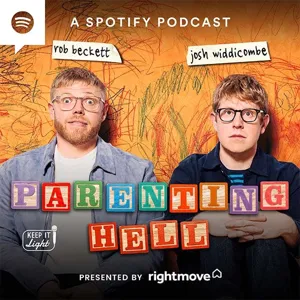Podcast Summary
Growing up with a parent with a personality disorder impacts child's sense of self: Individuals raised in toxic environments can adopt toxic behaviors or forge their own paths, emphasizing the importance of changing perception to alter thoughts, behaviors, and emotions.
Growing up with a parent with a personality disorder can significantly impact a child's developing sense of self and personality. The effects can vary greatly, with some individuals adopting toxic behaviors similar to their parents, while others choose to forge their own paths. The question of reality versus perception comes into play, as cognitive behavioral psychology emphasizes the importance of changing perception to alter thoughts, behaviors, and emotions. This can be particularly crucial for individuals who have grown up in toxic environments. Ultimately, the human condition offers a range of possibilities, and the way we interpret and respond to our experiences plays a significant role in shaping our futures.
Parents' unsolicited advice can impact adult children's emotional well-being negatively: Parents should focus on empathy and active listening instead of unsolicited advice to support adult children's emotional health and relationships
The way parents communicate with their adult children can significantly impact their emotional well-being. Unsolicited advice is one example of a behavior that can be off-putting and even harmful to adult children. Despite having greater autonomy and independence as adults, many people still crave love, acceptance, and validation from their parents. However, when parents provide unsolicited advice, it can feel dismissive and invalidating, rather than supportive. This can be particularly challenging for those who have experienced emotional or physical abuse from their parents. It's essential to recognize that even well-intentioned advice can be perceived negatively by adult children, and instead, focusing on empathy and active listening can be more beneficial. Overall, the way parents communicate with their adult children can have a profound impact on their emotional health and relationships.
Asking for what someone wants before giving advice: Instead of unsolicited advice, ask what someone wants from us in difficult conversations. Focus on active listening and empathy to build strong relationships.
Unsolicited advice and mandated gratitude from parents or others can be dismissive and off-putting. Instead, it's important to ask what someone wants from us when they come to us with their problems. They might just want to be heard and validated. Unsolicited advice can sometimes align with what they're looking for, making it more receptive. However, an autocratic style of "I know better" can be dismissive and make the person feel unheard. Similarly, reminding someone to be grateful can come across as dismissive and make it seem like the parent doesn't want to hear their problems. Instead, finding gratitude should be a personal journey. By focusing on what comes after the "but" in a difficult conversation, we can pay attention to the solution or the next step, rather than dwelling on the problem. Ultimately, active listening and empathy are key to effective communication and building strong relationships.
Parents shaping adult child relationships: Parents should engage, not dismiss, during conversations with adult children, avoiding self-centered comments and fostering open communication.
Parents play a significant role in shaping the relationship dynamics with their adult children. Gratitude, while important, should not be forced upon children, especially during painful moments, as it can come across as dismissive and insensitive. Jealous comments from parents can also harm the relationship, making it difficult for children to share intimate feelings. Parents should avoid making conversations about themselves when their children raise issues, as this can feel dismissive and lead to a game of one-upmanship. Instead, parents should engage with their children's concerns and make the conversation about them. By doing so, parents can be supportive role models and foster healthy, open relationships with their adult children.
Using humor and labels inappropriately can harm parent-child interactions: Parents should be mindful of the potential impact of their words and actions, and avoid using humor or labels in a dismissive or harmful way to ensure healthy and supportive parent-child relationships.
While humor and labeling can be effective tools in certain situations, they can also be dismissive and harmful when used inappropriately in parent-child interactions. Humor can be a great way to lighten the mood and build healthy relationships, but it can backfire and come across as insensitive when a child is seeking support and understanding from their parent. Similarly, labeling a child based on past behaviors or traits can be dismissive and blaming, potentially making the child feel unheard and undervalued. It's important for parents to be aware of the potential impact of their words and actions, and to create a safe and supportive environment where their children feel heard and understood.
Parents' labels and comments can impact adult children deeply: Parents' words and actions can shape self-perception and hinder emotional growth in adult children, especially those with borderline personality disorder
Labels and negative comments from parents, no matter how well-intentioned, can have a profound impact on adult children, potentially causing pain, burden, and even narcissistic tendencies. Parents' responses, such as awkwardness, avoidance, or focusing on their own anxiety, can hinder open communication and resolution of long-standing issues. These dynamics are particularly common in relationships between parents and adult children with borderline personality disorder. It's essential for parents to be mindful of their words and actions, as they can shape their children's self-perception and hinder healthy emotional growth.
Common behaviors that hinder communication: Unsolicited advice, reminders to be grateful, jealousy, making it about themselves, jokes, labeling, and awkwardness can hinder effective communication. Remember, we all want to feel heard, validated, and that our perspective matters.
Certain behaviors from parents or other significant figures in our lives can make it difficult for us to openly discuss our problems. These behaviors include unsolicited advice, reminders to be grateful, jealousy, making it about themselves, jokes, labeling, and awkwardness. These actions can trigger negative emotions and shut down communication. It's essential to remember that parents, like all of us, are learners and do the best they can. However, these common issues can also arise in various relationships, including those with a spouse, significant other, or friend. Ultimately, we all want to feel heard, validated, and that our perspective matters. It's not about making excuses or justifications but rather being aware of these potential roadblocks to effective communication.
Navigating conversations with narcissistic and borderline parents: When dealing with parents exhibiting narcissistic and borderline traits, discussions can be challenging. Seek help through therapy or strategies, address issues respectfully, and remember self-care.
When dealing with parents who exhibit narcissistic and borderline personality traits, conversations can be challenging due to the combination of these two conditions. Awkwardness and reminding them to be grateful, as well as labeling, can be common experiences. If you find yourself in such a situation, it may be helpful to discuss it in individual therapy or learn strategies for approaching these conversations. Remember, it's essential to address the elephant in the room, but do so in a respectful and understanding manner. For more information, reach out to the speaker through their email, website, or social media channels. Remember to take care of yourself and others as you navigate these complex interpersonal dynamics.






